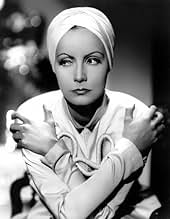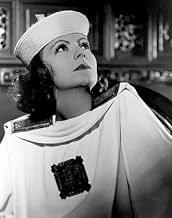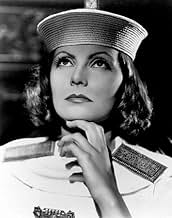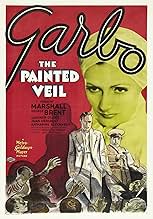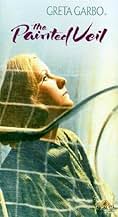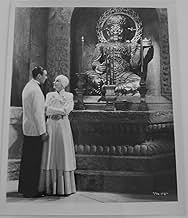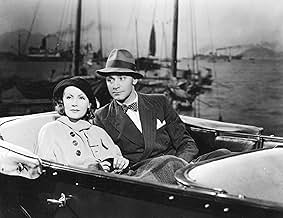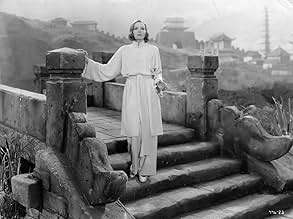AVALIAÇÃO DA IMDb
6,5/10
1,8 mil
SUA AVALIAÇÃO
Adicionar um enredo no seu idiomaA wife neglected by her husband, a medical researcher in China, falls in love with a dashing diplomatic attaché.A wife neglected by her husband, a medical researcher in China, falls in love with a dashing diplomatic attaché.A wife neglected by her husband, a medical researcher in China, falls in love with a dashing diplomatic attaché.
- Direção
- Roteiristas
- Artistas
- Prêmios
- 2 vitórias no total
Robert Adair
- Polo Player
- (cenas deletadas)
Mariska Aldrich
- German Teacher
- (cenas deletadas)
Maidena Armstrong
- German
- (cenas deletadas)
Billy Bevan
- Bridegroom
- (cenas deletadas)
Beulah Bondi
- Frau Koerber
- (cenas deletadas)
W.H. Davis
- German
- (cenas deletadas)
Vernon Dent
- Chief of Police
- (cenas deletadas)
Avaliações em destaque
Based on a book by W. Somerset Maugham of the same name, The Painted Veil tells the tale of Katrin Koerber (Greta Garbo) who is lonely after her sister's marriage, with whom she was very close. She agrees to marry her father's research associate Dr. Walter Fane (Herbert Marshall) who takes her to China. However, he is deeply involved with his work and often neglects Katrin in favour of his work which leads her to seek love and attention from another man: Jack Townsend (George Brent).
Although I have been unsure of Garbo's acting abilities at times, she does well and truly shine in the role of the unfaithful and confused wife - a complex character which she masters with ease. Herbert Marshall does a good job of her husband caught between emotions and George Brent not a terribly good looking man was unconvincing as her lover. These two men seem to fade into the background when Garbo is on screen her exotic; cat like appearance really captures the audience despite not playing a glamorous character!
The scenery of old China is lavish and the costumes for Garbo are a pleasure to see. However, the divine Greta Garbo is the only thing that really makes The Painted Veil watchable. The plot is thin and weak but Garbo does a wonderful job and makes the melodramatic material believable and interesting. Not a great film, but watch it for Garbo.
Although I have been unsure of Garbo's acting abilities at times, she does well and truly shine in the role of the unfaithful and confused wife - a complex character which she masters with ease. Herbert Marshall does a good job of her husband caught between emotions and George Brent not a terribly good looking man was unconvincing as her lover. These two men seem to fade into the background when Garbo is on screen her exotic; cat like appearance really captures the audience despite not playing a glamorous character!
The scenery of old China is lavish and the costumes for Garbo are a pleasure to see. However, the divine Greta Garbo is the only thing that really makes The Painted Veil watchable. The plot is thin and weak but Garbo does a wonderful job and makes the melodramatic material believable and interesting. Not a great film, but watch it for Garbo.
When I watched THE PAINTED VEIL, I thought that a remake should be made. Because the story has so much potential which couldn't have been explored sans restrictions in a movie made in the 1930s. Oddly enough, when I watched this film (early spring of 2006), it was announced that a remake of THE PAINTED VEIL was in the works and it's starring Naomi Watts in the role of Katrin. Well, after hearing this bit of news, I guess a good remake has yet to be made because casting Watts in the role played by Garbo is, well, ludicrous.
The best thing about the Garbo version of THE PAINTED VEIL is Garbo herself. She outshines the whole movie. Remove her from the film and, frankly, there's no reason to watch it. Garbo plays a very difficult role and pulls it off successfully. She beautifully underplays her role, which could have easily been fodder for scenery chewing if played by other actresses of that era. Watts has big shoes to fill.
The worst part of this version are two male co-stars, who aside from being almost indistinguishable from each other, are dull. It's hard to believe any woman would be interested in either of them, character or look-wise. And the production values, though good, aren't the most effective. Even though the budget was supposedly high for that time, there's a cheap, rushed feel to it (it was shot in two months!). No location film-making in China here. Another problem is the script which is obviously a truncated version of the W. Somerset Maugham novel. Something tells me big parts of the book were left out and the story in the film looks half complete. But the basis of this odd romance is still there and I find it fascinating. It's sorta like an anti-romance romantic story, or a reversed romantic story, which I've rarely seen before and having Garbo in this was perfect casting, because of she was such an unconventional star.
I rate the movie a 5 but because of Garbo, I give it a 7.
(P.S.: I finally read the book and did not like it at all. The Garbo film is an actual improvement)
The best thing about the Garbo version of THE PAINTED VEIL is Garbo herself. She outshines the whole movie. Remove her from the film and, frankly, there's no reason to watch it. Garbo plays a very difficult role and pulls it off successfully. She beautifully underplays her role, which could have easily been fodder for scenery chewing if played by other actresses of that era. Watts has big shoes to fill.
The worst part of this version are two male co-stars, who aside from being almost indistinguishable from each other, are dull. It's hard to believe any woman would be interested in either of them, character or look-wise. And the production values, though good, aren't the most effective. Even though the budget was supposedly high for that time, there's a cheap, rushed feel to it (it was shot in two months!). No location film-making in China here. Another problem is the script which is obviously a truncated version of the W. Somerset Maugham novel. Something tells me big parts of the book were left out and the story in the film looks half complete. But the basis of this odd romance is still there and I find it fascinating. It's sorta like an anti-romance romantic story, or a reversed romantic story, which I've rarely seen before and having Garbo in this was perfect casting, because of she was such an unconventional star.
I rate the movie a 5 but because of Garbo, I give it a 7.
(P.S.: I finally read the book and did not like it at all. The Garbo film is an actual improvement)
This movie is imperfect, but I love it anyway.
Its imperfections:
The soundstage China of 1933's "Bitter Tea of General Yen" leaves the soundstage China of 1934's "Painted Veil" in the dust. "Yen's" China draws you in and intoxicates you. "Painted Veil's" China is fun, but it's a bit silly and superficial. A San Francisco Chinatown Chinese New Year's parade would be more profound.
George Brent is at his worst here. I've never seen him do anything quite like what he does here -- a fly-by-night and exploitative romancer who toys with women's hearts.
Brent wasn't great looking, but he was very good at playing the grounded, reliable foil to electric characters like Bette Davis' Judith Traherne in "Dark Victory."
Here, as Townsend, while speaking serious words, Brent adopts a silly smile, and -- literally -- renounces everything he says in the very next sentence. Maybe a much better looking, or more conventionally handsome, actor could have made this character charming in a snake-like, dangerous way (Erroll Flynn?) but Brent didn't really have the equipment to make Townsend as charming to the audience as he might have been to a neglected wife in China.
Garbo plays a near spinster who watches her younger sister marry, and, on the rebound, marries a man she doesn't love out of desperation.
How on earth could anyone make sense of *Garbo* as a desperate spinster? The movie doesn't even try to make sense of that. It just asks us to believe it. The viewer has to try to make up reasons for her spinster status. (Her parents kept her locked in a closet the first thirty or so years of her life? She had a horrible facial deformaty that suddenly fell off?)
BUT!
I still love this movie.
I love it for the moment when Herbert Marshall says, with the kind of real passion you expect of a contemporary production of a Eugene O'Neill play, that he despises himself for loving Garbo, after she has cuckolded him.
It's great to see Marshall, who so often played helpless men ill used by women ("The Letter," "Duel in the Sun," "The Little Foxes"), here finally able to effectively express his bitterness at being so ill used, and take some action in response, even if that action is intended to be fatal.
I love it for the complications that arise in the final portion. Hearts are changed. Suffering and human sacrifice changes them. Love is born of the kind of big events that sometimes do change people, and life stories, in real life.
This ending, though not in compliance with Maughm's novel, didn't strike me as a "Hollywood" "happy" ending at all. It struck me as a profound ending. It reminded me of a more recent film, Bertolucci's "Besieged," that also talks about the role of altruism in love and eroticism.
For those features, I deeply value this movie, in spite of its superficial imperfections.
Its imperfections:
The soundstage China of 1933's "Bitter Tea of General Yen" leaves the soundstage China of 1934's "Painted Veil" in the dust. "Yen's" China draws you in and intoxicates you. "Painted Veil's" China is fun, but it's a bit silly and superficial. A San Francisco Chinatown Chinese New Year's parade would be more profound.
George Brent is at his worst here. I've never seen him do anything quite like what he does here -- a fly-by-night and exploitative romancer who toys with women's hearts.
Brent wasn't great looking, but he was very good at playing the grounded, reliable foil to electric characters like Bette Davis' Judith Traherne in "Dark Victory."
Here, as Townsend, while speaking serious words, Brent adopts a silly smile, and -- literally -- renounces everything he says in the very next sentence. Maybe a much better looking, or more conventionally handsome, actor could have made this character charming in a snake-like, dangerous way (Erroll Flynn?) but Brent didn't really have the equipment to make Townsend as charming to the audience as he might have been to a neglected wife in China.
Garbo plays a near spinster who watches her younger sister marry, and, on the rebound, marries a man she doesn't love out of desperation.
How on earth could anyone make sense of *Garbo* as a desperate spinster? The movie doesn't even try to make sense of that. It just asks us to believe it. The viewer has to try to make up reasons for her spinster status. (Her parents kept her locked in a closet the first thirty or so years of her life? She had a horrible facial deformaty that suddenly fell off?)
BUT!
I still love this movie.
I love it for the moment when Herbert Marshall says, with the kind of real passion you expect of a contemporary production of a Eugene O'Neill play, that he despises himself for loving Garbo, after she has cuckolded him.
It's great to see Marshall, who so often played helpless men ill used by women ("The Letter," "Duel in the Sun," "The Little Foxes"), here finally able to effectively express his bitterness at being so ill used, and take some action in response, even if that action is intended to be fatal.
I love it for the complications that arise in the final portion. Hearts are changed. Suffering and human sacrifice changes them. Love is born of the kind of big events that sometimes do change people, and life stories, in real life.
This ending, though not in compliance with Maughm's novel, didn't strike me as a "Hollywood" "happy" ending at all. It struck me as a profound ending. It reminded me of a more recent film, Bertolucci's "Besieged," that also talks about the role of altruism in love and eroticism.
For those features, I deeply value this movie, in spite of its superficial imperfections.
Greta Garbo stars with Herbert Marshall, George Brent, Warner Oland, and Jean Hersholt in "The Painted Veil," from 1934, based on the novel by Somerset Maugham. Garbo plays an Austrian woman, Katrin, who grabs at the chance to marry her father's research assistant, Walter Fane (Marshall) after her sister marries and leaves home. At first, they are happy, as Katrin gets to see parts of the world she hasn't seen. Soon, however, she becomes lonely, as Walter is busy fighting a cholera epidemic.
Katrin falls for Jack Townsend (George Brent) from the British embassy, and the two enter into a passionate affair. Walter finds out; then Katrin is humiliated when she realizes that Jack cares more for his reputation than her and does not seem willing to get a divorce. Walter insists that she travel with him as he goes deeper into China to fight the epidemic; she realizes he just wants her to get sick and die.
Garbo is incredible in this film - warm, sweet, and flirtatious in the beginning, and rising to the dramatic challenges later, she gives a beautifully layered, sympathetic, and powerful performance. Marshall is very good, as is the rest of the cast - but Garbo just walks away with the whole thing. A very unusual presence and talent, very passionate and committed. It's such a shame that she didn't pursue opportunities for films in Europe after the war.
Also, the Chinese atmosphere (totally MGM backlot) feels very authentic.
This film ends differently from the 2006 version. Though I liked the 2006 version, it lacks the magic of this one. Magic, spelled G-a-r-b-o.
Katrin falls for Jack Townsend (George Brent) from the British embassy, and the two enter into a passionate affair. Walter finds out; then Katrin is humiliated when she realizes that Jack cares more for his reputation than her and does not seem willing to get a divorce. Walter insists that she travel with him as he goes deeper into China to fight the epidemic; she realizes he just wants her to get sick and die.
Garbo is incredible in this film - warm, sweet, and flirtatious in the beginning, and rising to the dramatic challenges later, she gives a beautifully layered, sympathetic, and powerful performance. Marshall is very good, as is the rest of the cast - but Garbo just walks away with the whole thing. A very unusual presence and talent, very passionate and committed. It's such a shame that she didn't pursue opportunities for films in Europe after the war.
Also, the Chinese atmosphere (totally MGM backlot) feels very authentic.
This film ends differently from the 2006 version. Though I liked the 2006 version, it lacks the magic of this one. Magic, spelled G-a-r-b-o.
This film has some rather fantastic elements about it, mainly that Greta Garbo would be playing a spinster, and that having several suitors - as her mother claims that she has - she would hastily accept a marriage proposal from someone for whom she has absolutely no passion. In this case it is Herbert Marshall playing both an unloved husband and a devoted medical researcher into the cause and prevention of cholera. The other fantastic element is trying to believe that there is any chemistry between Garbo and "the other man, George Brent. Brent - who was so wonderful with Kay Francis, Bette Davis, and Ruth Chatterton - is here no more attractive than the husband he is trying to supplant. He has all the chemistry of a cardboard box.
The best part of the film is once Marshall realizes he has been cuckolded and makes an ultimatum to his faithless wife. He has just learned of a raging cholera epidemic in inland China and must go there and try to get it under control. His wife can stay behind if Brent's character agrees to get a divorce, in which case she can also have one. If he does not agree to this, then Garbo must come along with him on his expedition and thus be exposed to the most extreme danger.
This was one of Garbo's first films after the production code came into effect earlier in 1934. There were so many limits put on what could be said and shown and even insinuated that it really put a damper on what was supposed to be a pretty torrid love triangle. Trying to perform in a moral straight jacket is probably what really cost this film its potential edge. I'd recommend this for Garbo completists only.
The best part of the film is once Marshall realizes he has been cuckolded and makes an ultimatum to his faithless wife. He has just learned of a raging cholera epidemic in inland China and must go there and try to get it under control. His wife can stay behind if Brent's character agrees to get a divorce, in which case she can also have one. If he does not agree to this, then Garbo must come along with him on his expedition and thus be exposed to the most extreme danger.
This was one of Garbo's first films after the production code came into effect earlier in 1934. There were so many limits put on what could be said and shown and even insinuated that it really put a damper on what was supposed to be a pretty torrid love triangle. Trying to perform in a moral straight jacket is probably what really cost this film its potential edge. I'd recommend this for Garbo completists only.
Você sabia?
- CuriosidadesRainha Christina (1933) and O Véu Pintado (1934) were both huge hits in Europe (making twice their budget in the UK alone), but were underwhelming US successes.
- Erros de gravaçãoA box is marked "Scotch Whiskey", which is the American spelling of whiskey. In the United Kingdom, however, it is spelled with no 'e' and is simply "whisky". Therefore, had the whisk(e)y been imported directly from Scotland, it should have had the 'whisky' spelling.
- Citações
Katrin Koerber Fane: [after Townsend impulsively kisses Katrin] How could you?
Jack Townsend: I could.
- Cenas durante ou pós-créditosGreta Garbo's name in the opening credits uses a font that forms the same Gothic arch in the letters as is used in W. Somerset Maugham's symbol. The other credits also use this to a lesser extent.
- ConexõesFeatured in Terra dos Deuses (1937)
- Trilhas sonorasBridal Chorus (Here Comes the Bride)
(1850) (uncredited)
from "Lohengrin"
Written by Richard Wagner
Played as background music in the wedding scene
Principais escolhas
Faça login para avaliar e ver a lista de recomendações personalizadas
- How long is The Painted Veil?Fornecido pela Alexa
Detalhes
Bilheteria
- Orçamento
- US$ 947.000 (estimativa)
- Tempo de duração
- 1 h 25 min(85 min)
- Cor
- Proporção
- 1.37 : 1
Contribua para esta página
Sugerir uma alteração ou adicionar conteúdo ausente

